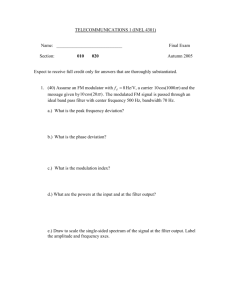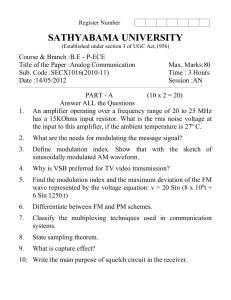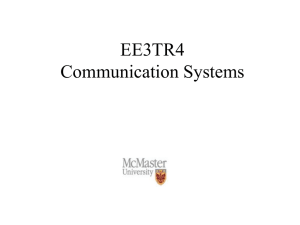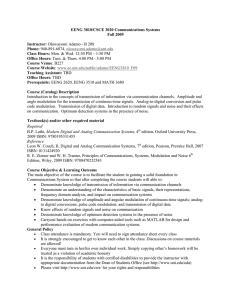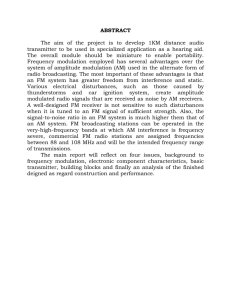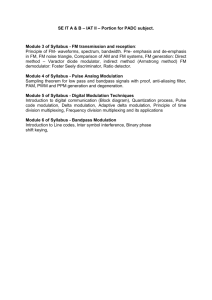ECE318 Analog and Digital Communications
advertisement
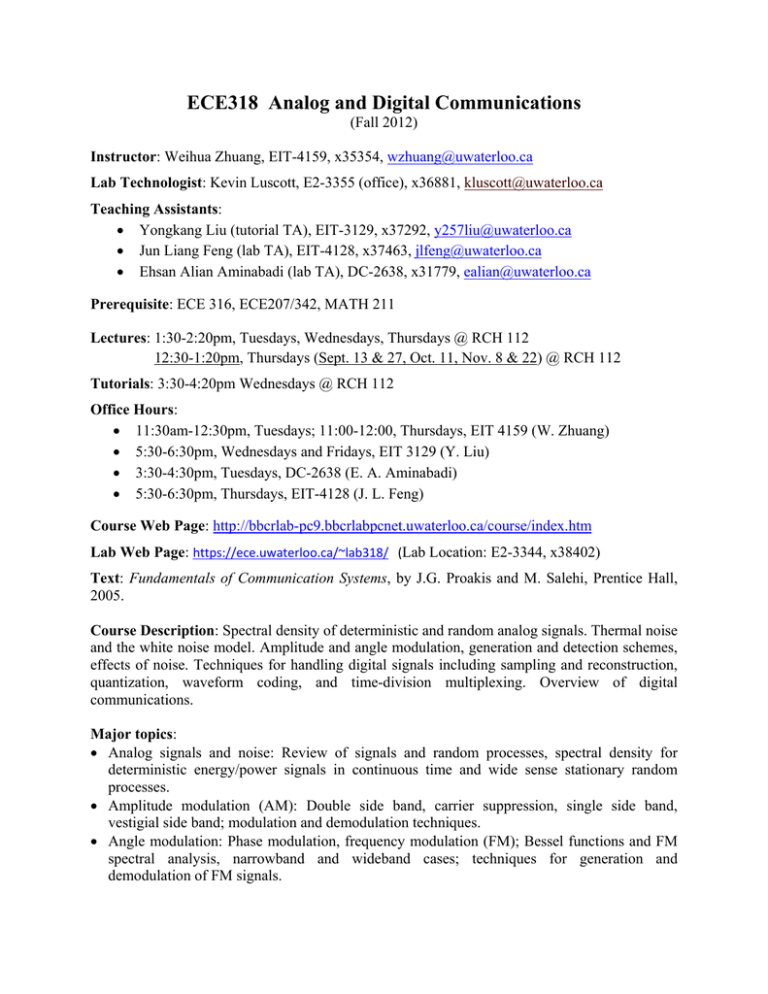
ECE318 Analog and Digital Communications (Fall 2012) Instructor: Weihua Zhuang, EIT-4159, x35354, wzhuang@uwaterloo.ca Lab Technologist: Kevin Luscott, E2-3355 (office), x36881, kluscott@uwaterloo.ca Teaching Assistants: Yongkang Liu (tutorial TA), EIT-3129, x37292, y257liu@uwaterloo.ca Jun Liang Feng (lab TA), EIT-4128, x37463, jlfeng@uwaterloo.ca Ehsan Alian Aminabadi (lab TA), DC-2638, x31779, ealian@uwaterloo.ca Prerequisite: ECE 316, ECE207/342, MATH 211 Lectures: 1:30-2:20pm, Tuesdays, Wednesdays, Thursdays @ RCH 112 12:30-1:20pm, Thursdays (Sept. 13 & 27, Oct. 11, Nov. 8 & 22) @ RCH 112 Tutorials: 3:30-4:20pm Wednesdays @ RCH 112 Office Hours: 11:30am-12:30pm, Tuesdays; 11:00-12:00, Thursdays, EIT 4159 (W. Zhuang) 5:30-6:30pm, Wednesdays and Fridays, EIT 3129 (Y. Liu) 3:30-4:30pm, Tuesdays, DC-2638 (E. A. Aminabadi) 5:30-6:30pm, Thursdays, EIT-4128 (J. L. Feng) Course Web Page: http://bbcrlab-pc9.bbcrlabpcnet.uwaterloo.ca/course/index.htm Lab Web Page: https://ece.uwaterloo.ca/~lab318/ (Lab Location: E2-3344, x38402) Text: Fundamentals of Communication Systems, by J.G. Proakis and M. Salehi, Prentice Hall, 2005. Course Description: Spectral density of deterministic and random analog signals. Thermal noise and the white noise model. Amplitude and angle modulation, generation and detection schemes, effects of noise. Techniques for handling digital signals including sampling and reconstruction, quantization, waveform coding, and time-division multiplexing. Overview of digital communications. Major topics: Analog signals and noise: Review of signals and random processes, spectral density for deterministic energy/power signals in continuous time and wide sense stationary random processes. Amplitude modulation (AM): Double side band, carrier suppression, single side band, vestigial side band; modulation and demodulation techniques. Angle modulation: Phase modulation, frequency modulation (FM); Bessel functions and FM spectral analysis, narrowband and wideband cases; techniques for generation and demodulation of FM signals. Analysis of noise effect: Thermal noise, time-averaged noise statistics, narrow band representation of white noise; signal-to-noise ratio analysis of AM and FM systems; threshold effect in FM radio. Digital signals: Sampling theorem; reconstruction and aliasing, natural and flattop sampling, application to time-division multiplexing; practical reconstruction scheme (zero-order hold); quantization. Waveform coding techniques: Pulse code modulation (PCM); noise in PCM systems; differential pulse code modulation (DPCM); delta modulation (DM). Overview of digital communications: Digital modulation such as ASK, FSK, PSK, optimal receiver, and probability of error. Homework Assignments: The assignment problems and solutions will be on the course web page. Tutorials: The tutorials will be conducted by the TA's for the purposes of (1) answering questions about the course materials, (2) providing example problems that illustrate applications of the theory learned in the class and detailing methods of solution, and (3) elaborating the course materials if necessary. Tutorial examples will be available before the tutorial (by Tuesday evening) on the course web page. Labs: Details of experiments that supplement the lecture material can be found on the lab website. Your timetable indicates your laboratory section and experiment dates. Students are to work in groups of two and need to select a partner from within their laboratory section. Groups of one may be permitted at the discretion of the lab instructor. Only one prelab and one report per group needs to be submitted, except as indicated below. If you are absent from a lab session for a valid reason (validity to be determined by the course and/or lab instructor), you are required to catch up with the missed work. A separate report, from your partner, must be submitted based upon your own observations. Absence without a valid reason will result in a report grade of zero. All pre-labs and reports are to be submitted by 11:59pm on the date that it is due. Submissions are to be to your ECE318 Course Book group account in pdf format using the naming convention (i.e., for lab2 prelab "lab2prep.pdf" and lab2 report "lab2rpt.pdf"). Failure to submit your prelab or report correctly, using one of the above methods, by 11:59pm on the due date will result in a penalty of -20%. Failure to submit your prelab or report correctly within 24 hours of the due date will result in a grade of zero. It is the responsibility of both partners to make sure that your electronic submission was uploaded and time stamped successfully by the due date (i.e., one partner should upload the file to Course Book and the other partner should download the file again and verify that it is the correct one). Grading: Laboratory=15%, Midterm=35%, Final Exam=50%.
